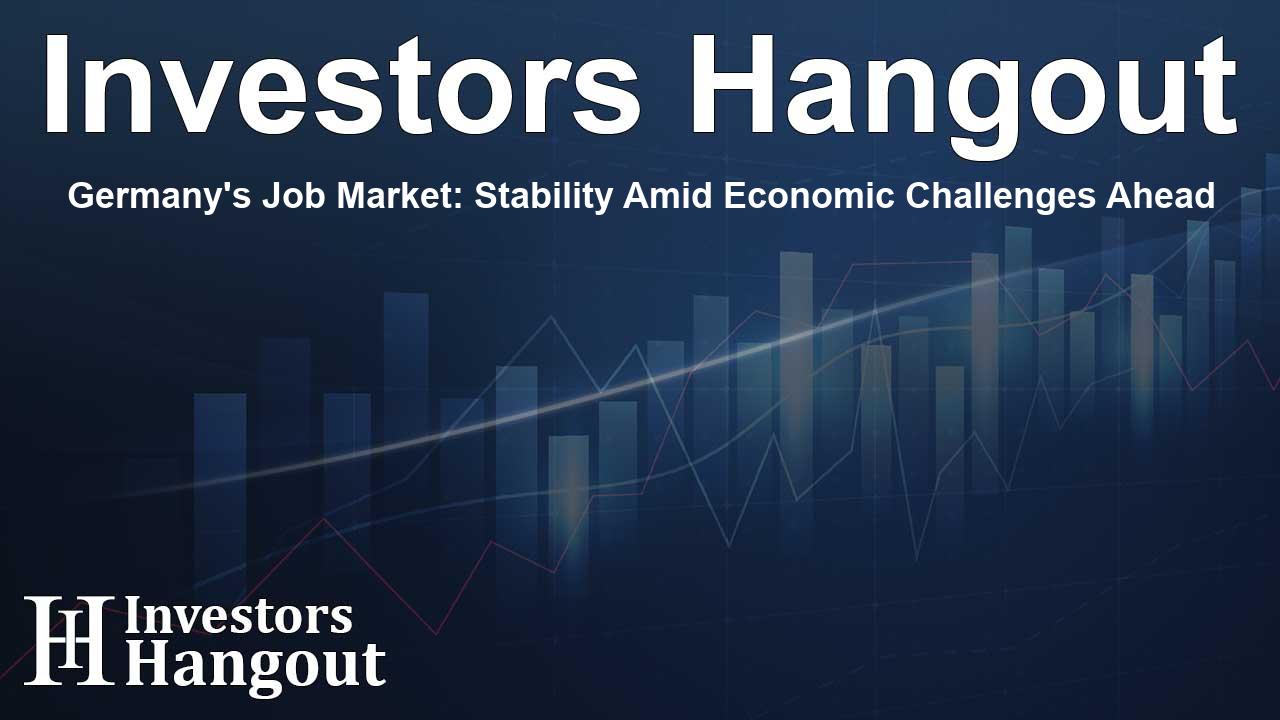Germany's Job Market: Stability Amid Economic Challenges Ahead

Germany's Unemployment Rate Remains Unchanged
Germany’s unemployment rate has remained steady at 6.1% as of December, according to the latest statistics from the Federal Employment Agency. This figure slightly surpasses the expectations of economists who had forecasted a rate of 6.2%. It’s a positive sign; however, the labor market is showing signs of strain.
Jobless Claims Indicate Labor Market Shifts
Despite the stable jobless rate, the number of jobless claims surged by 10,000 in December, a significant jump from the 6,000 claims recorded in November. This increase hints at potential disruptions in employment as the economy navigates through complex challenges.
Job Vacancies on the Decline
The total number of registered job vacancies in Germany also reflects a downward trend, dropping to around 654,000. This is a notable decrease of about 59,000 compared to the same time last year, signalling that companies may be cautious about hiring amidst uncertain economic conditions.
Major Companies Announce Job Cuts
Several prominent industrial firms, including Thyssenkrupp, Bosch, and Schaeffler, are hinting at or have already announced job cuts. Such moves reflect the struggles facing Europe’s largest economy as it grapples with ongoing manufacturing challenges. The implications of these cuts could be significant on the overall job market.
Volkswagen's Workforce Reduction Plans
Volkswagen, one of the leading auto producers, recently reached an agreement with labor unions to avoid immediate layoffs and prevent factory closures in the country. Nevertheless, they still plan to execute a substantial workforce reduction, targeting the loss of 35,000 jobs in the upcoming years, indicating the depth of the current economic challenges.
A Historical Comparison of Unemployment Rates
In recent years, the unemployment rate in Germany has undergone fluctuations, rising slightly from around 5% in 2022. The current figures mirror the levels observed in early 2021 when the economy was grappling with the aftermath of the pandemic. Such historical context emphasizes the ongoing turbulence in the labor market.
Looking Ahead: Economic Outlook
As we advance into the next phases of economic recovery, the prospects for Germany’s labor market will continue to hang in balance. While industries may face hardships, there are opportunities for adaptation and growth in emerging sectors as well. How these dynamics unfold will determine the overall employment landscape in Germany.
Frequently Asked Questions
What is the current unemployment rate in Germany?
The unemployment rate in Germany remained at 6.1% as of December.
How have jobless claims changed recently?
Jobless claims rose by 10,000 in December, marking a significant increase from November.
What does the decrease in job vacancies indicate?
The decrease in job vacancies by approximately 59,000 suggests a cautious hiring environment among companies.
Are major companies in Germany planning job cuts?
Yes, companies like Thyssenkrupp, Bosch, and Volkswagen have announced or hinted at job cuts.
How does the current unemployment rate compare to past years?
The current unemployment rate reflects a slight increase from 5% in 2022 and mirrors levels from early 2021.
About Investors Hangout
Investors Hangout is a leading online stock forum for financial discussion and learning, offering a wide range of free tools and resources. It draws in traders of all levels, who exchange market knowledge, investigate trading tactics, and keep an eye on industry developments in real time. Featuring financial articles, stock message boards, quotes, charts, company profiles, and live news updates. Through cooperative learning and a wealth of informational resources, it helps users from novices creating their first portfolios to experts honing their techniques. Join Investors Hangout today: https://investorshangout.com/
Disclaimer: The content of this article is solely for general informational purposes only; it does not represent legal, financial, or investment advice. Investors Hangout does not offer financial advice; the author is not a licensed financial advisor. Consult a qualified advisor before making any financial or investment decisions based on this article. The author's interpretation of publicly available data shapes the opinions presented here; as a result, they should not be taken as advice to purchase, sell, or hold any securities mentioned or any other investments. The author does not guarantee the accuracy, completeness, or timeliness of any material, providing it "as is." Information and market conditions may change; past performance is not indicative of future outcomes. If any of the material offered here is inaccurate, please contact us for corrections.